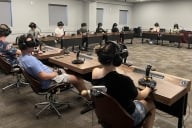You have /5 articles left.
Sign up for a free account or log in.

Joe Mabel/Wikimedia Commons
The University of Washington was the first major U.S. college or university to announce, amid rising concerns about the coronavirus's spread, that it would move instruction online. At that point Seattle was the epicenter of the disease in the United States.
The UW campuses were kept open for students who had nowhere else to go, but many chose to leave.
Preliminary data from the university showed occupancy on campus for this spring is about 22 to 24 percent of what it was in the fall. Though the university is enrolling more registered students this spring than last, it saw an increased number of student withdrawals after March 18, when it announced the move to remote instruction for the full spring quarter. From that day to March 29, there were 225 withdrawals, compared to 153 in the same period last year.
We checked in with faculty members at the university to ask how the transition was going for them and their students.
Successful, but Stressful
Joseph Janes, a professor in the Information School and chair of the Faculty Senate, said the move was going "about as well as you could expect." While there have been, to his knowledge, no technological disasters, faculty members in his school, like many others during this crisis, are stretched thin.
"The level of stress, the level of uncertainty and anxiety is just really high, and for understandable reasons," he said during an interview over spring break. "People are managing and doing the best they can and particularly trying to reassure students and stay in touch with students, many of whom are feeling very anxious, very stressed in a deeply uncertain time for all of us."
The University of Washington uses a quarter system. Though the original announcement by President Ana Mari Cauce said the university would be online for its winter quarter, which ended March 20, the university extended the suspension to the spring term, which begins Monday.
Janes said faculty members relied heavily on adrenaline during the last weeks of the quarter. The spring may be a bigger challenge. Moving an ongoing class online, where instructors benefit from already having a relationship with students, is one thing. Starting a class online is another, entirely.
"Now it's the long haul, and I think that's setting in," he said. "Some disciplines are going to find that easier than others."
Courses That Can't Be Adapted
Since a massive wave of colleges have now moved to online delivery, many have questioned how faculty can conduct courses in dance, social work, forestry and other disciplines that usually require fieldwork or physical presence. And, for students majoring in those fields, what will happen if these courses cannot be completed?
Jennifer Salk, who chairs UW's dance department, said that in the winter session, instructors teaching dance technique courses (such as ballet, tango or tap) simply had to grade students on the work they had already completed. The technique classes couldn't be completed online.
"Our students are dispersing all over the world," Salk said. "They might have a three-by-three space to move in. Safety and viability and integrity would be lost."
For the spring quarter, all dance technique courses, over 20 of them, have been canceled, along with a few others that couldn't be adapted for online. Salk said most students who are dance majors already have the required credit for those types of courses. For the very few who don't, the department is waiving the requirement.
"There's just nothing we can do. It's not their fault," she said. "We can't make them stay an extra quarter because this happened to them."
The university offers over 7,000 courses across its three campuses. For this spring, only about 175 have been canceled.
The dance department is offering a few small, not-for-credit technique course options that are specifically designed for small spaces.
But Salk emphasized that many other dance courses can continue perfectly well online with some minor adjustments. Independent studies and capstone classes are one example, as well as an introductory dance course that already was held online. Salk herself designed the online class -- where students learn dance concepts, respond to readings and interview dancers -- about 10 years ago. All department graduate students, who previously taught technique courses, now grade students in the online class. The course is open to campus.
Help From Administrators
Salk said the university has been very helpful for faculty in figuring out technology and course design. Cauce announced that the university would be making the first week of courses free of graded assignments, giving everyone time to get to know each other and figure out the technology.
"They're doing an incredible job," Salk said. "They're doing the best they can."
Michelle Bagshaw, a lecturer in the School of Social Work and associate director of the Office of Field Education, said that in her personal experience, the transition has gone well. The university held trainings for professors on technology, online teaching and course design.
"Our dean's office really mobilized," she said. "They brought in instructors with expertise in creating and delivering online courses and offered training immediately, in addition to the deans and program faculty being available to consult with faculty about questions they have."
Faculty from the Information School also helped run trainings on software like Zoom and Panopto.
Social work as a discipline often requires practical field experience. One of the requirements for a social welfare major, for example, is structured practical learning. Though the university has had to pull students out of working physically in the community, the college has developed some remote activities students can do with local agencies to achieve the same competencies.
"Agencies are in crisis right now," Bagshaw said. "If there's anything our students can do to support them, that's our first hope."
Being Understanding About Unprecedented Challenges
Bagshaw herself is running an undergrad capstone class. She's cleared the first hurdle -- an in-class panel of experts -- by transitioning to a recorded interview to be posted online.
Janes said many faculty may be in challenging situations right now, with kids or elderly relatives at home. He says people have responded by becoming more flexible and understanding of one another.
"I don't think any of us ever thought anything like this would ever happen," he said. "It's just going to be part of the fabric of how transcripts are written, how CVs are written, how we do personnel decisions for this year."
Janes added, "This is just going to be one of those things that we carry with us for 30 years."








